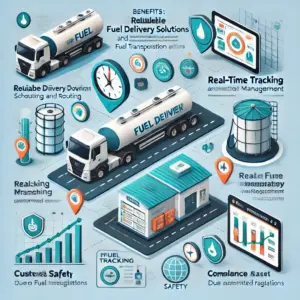
In today’s fast-paced world, businesses across various sectors are constantly seeking ways to enhance efficiency and reduce costs. For companies reliant on fuel, whether for transportation, construction, or manufacturing, finding a reliable fuel delivery solution can be a game-changer. Efficient fuel delivery not only saves time but also minimizes operational costs, enabling businesses to focus on their core activities without worrying about fuel logistics.
The Importance of Reliable Fuel Delivery
Reliable fuel delivery is critical for any business that depends on fuel to operate. When fuel supply chains break down, it can lead to delays, increased operational costs, and potential loss of revenue. Companies that can ensure a steady and reliable fuel supply have a distinct advantage over their competitors. This reliability is not just about having fuel available; it’s about knowing when and how much fuel will be delivered, ensuring that equipment and vehicles run smoothly, and avoiding costly downtimes.
Common Challenges in Fuel Delivery
Many businesses face challenges in managing their fuel deliveries effectively. Some common issues include:
- Inconsistent Delivery Times: Delayed deliveries can lead to production halts or idle vehicles, impacting overall efficiency.
- Rising Fuel Costs: Fluctuating fuel prices can affect budgeting and forecasting, making it difficult for companies to manage their finances.
- Inventory Management: Keeping track of fuel levels and usage can be challenging, leading to over-ordering or stockouts.
- Compliance and Safety: Navigating regulations related to fuel transportation can be complex, requiring businesses to stay informed and compliant.
Fuel Transportation Software: A Solution to Common Problems
To address these challenges, many companies are turning to fuel transportation software. This technology streamlines the fuel delivery process, allowing businesses to manage their fuel logistics more effectively. Here are some key benefits of using fuel transportation software:
1. Improved Scheduling and Routing
One of the most significant advantages of fuel transportation software is its ability to optimize scheduling and routing. The software uses algorithms to determine the most efficient routes for delivery trucks, taking into account factors like traffic patterns, weather conditions, and delivery windows. This not only saves time but also reduces fuel consumption, leading to cost savings.
2. Real-Time Tracking
With fuel transportation software, businesses can track their deliveries in real-time. This visibility allows companies to know exactly when to expect fuel deliveries, enabling them to plan operations accordingly. Real-time tracking also enhances accountability, as both suppliers and customers can monitor the status of their deliveries.
3. Automated Inventory Management
Effective inventory management is crucial for businesses that rely on fuel. Fuel transportation software can automate inventory tracking, providing insights into usage patterns and helping businesses maintain optimal fuel levels. This reduces the risk of stockouts and allows companies to plan their orders more accurately.
4. Cost Control
By streamlining fuel delivery processes, businesses can gain better control over their fuel costs. Fuel transportation software helps identify trends in fuel consumption and spending, allowing companies to make informed decisions about their fuel purchasing strategies. This data-driven approach leads to more efficient budgeting and forecasting.
5. Compliance and Safety Features
Navigating the regulatory landscape surrounding fuel transportation can be daunting. Fuel transportation software often includes compliance management features, ensuring that businesses adhere to safety standards and regulations. This reduces the risk of costly fines and enhances operational safety.
Implementing Fuel Transportation Software
Transitioning to fuel transportation software is a strategic move that can yield significant benefits. However, it’s essential to approach the implementation process carefully. Here are some steps to ensure a successful transition:
1. Assess Your Needs
Before selecting a fuel transportation software solution, assess your specific needs. Consider factors like the volume of fuel you transport, the geographic areas you serve, and any compliance requirements. Understanding your unique challenges will help you choose the right software for your business.
2. Research Available Solutions
Take the time to research different fuel transportation software solutions. Look for software that offers the features most relevant to your needs, such as real-time tracking, automated inventory management, and compliance tools. Reading customer reviews and case studies can provide valuable insights into each solution’s effectiveness.
3. Involve Key Stakeholders
Involving key stakeholders in the decision-making process is crucial for a successful implementation. This includes team members from operations, finance, and compliance. Their input can help ensure that the chosen software meets the needs of all departments and facilitates smooth adoption.
4. Provide Training
Once you’ve selected a fuel transportation software solution, invest in training for your staff. Proper training ensures that team members can effectively use the software, maximizing its benefits. Consider offering ongoing support to address any questions or challenges that arise during the transition.
5. Monitor and Evaluate Performance
After implementing the software, monitor its performance regularly. Track key metrics such as delivery times, fuel costs, and compliance rates. Use this data to evaluate the effectiveness of the software and make any necessary adjustments.
Conclusion
In a world where time and cost efficiency are paramount, reliable fuel delivery solutions can significantly impact a business’s success. By leveraging fuel transportation software, companies can streamline their fuel logistics, enhance accountability, and gain better control over their fuel costs. The result is a more efficient operation that can focus on growth and customer satisfaction.
Investing in fuel transportation software is not just about technology; it’s about making a strategic choice to improve operational efficiency and stay ahead in a competitive market. Embrace the advantages of reliable fuel delivery solutions and watch your business save time and money while achieving its goals.
By adopting this technology, you’ll not only improve your operations but also position your company for long-term success in a constantly evolving industry. With careful implementation and a focus on continuous improvement, fuel transportation software can be a valuable asset in your business’s journey toward efficiency and growth.




Leave a Reply